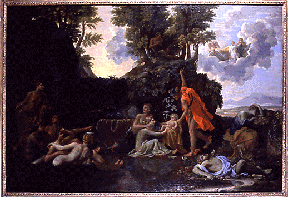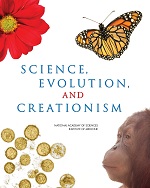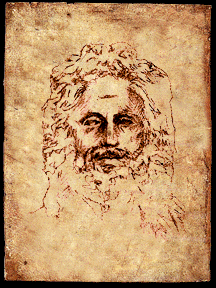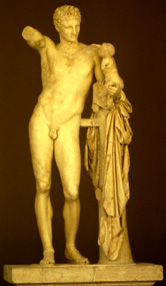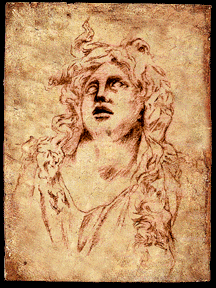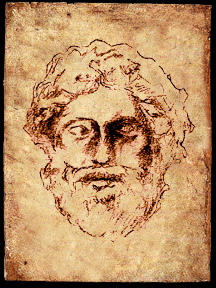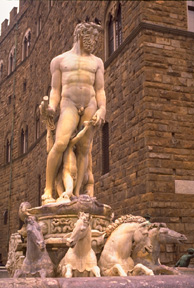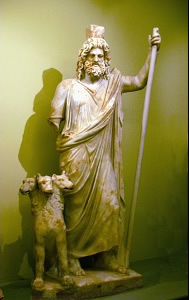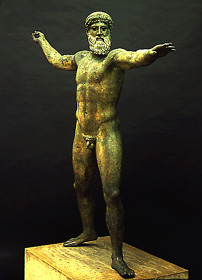Click on image for full size
Image courtesy of the Fogg Art Museum. Gift of Mrs. Samuel Sachs in memory of Mr. Samuel Sachs. To be reproduced only by permission of the Harvard University Art Museums. (c) President and Fellows of Harvard College, Harvard University Art Museums.
Mercury and the Birth of Bacchus
Mercury was the prankster of the gods. And yet, in spite of his pranks, he won the affection of all the gods because of his playfulness, innocence, and helpfulness. He was particularly helpful to Jupiter, his father, and became his official messenger and trusted aide. It was Mercury who drove the herd of Agenor, with Jupiter disguised as a bull mingled in with them, towards the Princess Europa on the Phoenician shores of the Mediterranean. It was Mercury who lulled Argos to sleep, then slew him and freed Io. Mercury came again to the aide of his father on the occasion of the birth of Bacchus, god of wine. Now Semele was the daughter of Cadmus, brother of Europa, and Harmonia, daughter of Mars and Venus.
Jupiter caught site of Semele one spring day, and as was his habit, fell in love with her. Jupiter came to her in simple attire, wooed her, and won her. Jupiter's jealous wife, Juno, plotted revenge against this new rival for her husband's affections. She assumed the guise of Semele's aged nurse, and, as the trusted servant, suggested that perhaps her lover was not who he claimed to be. Semele had to know, so she extracted an oath from Jupiter, the next time she saw him, that he would come to her in all his glory, to prove that he was really who he claimed to be. "Kill me if you can with one fierce Divine embrace!" she cried out. By this time Semele was already pregnant by Jupiter with the child Bacchus. Jupiter, having sworn on the sacred River Styx to grant Semele any wish she desired, had no recourse but to come to Semele as she had desired. Clothed in all his splendor, including lightning and thunder, Jupiter entered the bedchamber of Semele, embraced her with searing and divine radiance, and in an instant she was consumed to ashes. As Semele was engulfed in brilliant rapture, Jupiter plucked the unborn infant Bacchus from her womb, and sewed him into his thigh. In due time Jupiter drew forth Bacchus from his thigh-womb, with the help of Ilithyia, and Bacchus was born again. To protect Bacchus from the hostility of his jealous wife Juno, Jupiter entrusted the infant to his loyal son and servant Mercury, who took him to Orchomenus and placed him in the care of Semele's sister Io.


